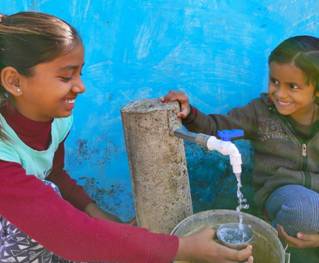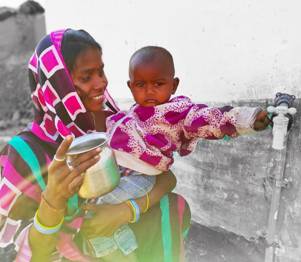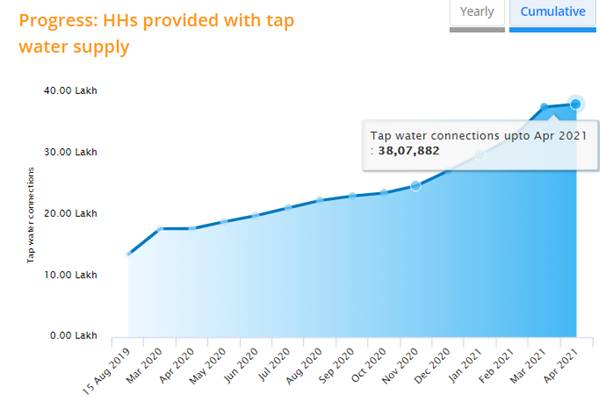To provide safe and potable piped drinking water to all the rural household in Madhya Pradesh, the first tranche of Rs. 1,184.86 Cores have been released by the National Jal Jeevan Mission, Ministry of Jal Shakti, Government of India to the State. Keeping in view the commitment of the State to make provision of tap water supply in every rural home by 2023, in 2021-22, Rs. 5,116.79 Crore Central grant-in-aid has been allocated to Madhya Pradesh for the implementation of Jal Jeevan Mission. In 2019-20, Central Government allocated Rs. 571.60 Crore which was increased to Rs. 1,280.13 Crore in 2020-21. Union Minister, Jal Shakti Shri Gajendra Singh Shekhawat during his meeting with the Chief Minister, Madhya Pradesh at Bhopal has assured full funding for Jal Jeevan Mission to make provision of tap water supply to every rural home.
Shri Gajendra Singh Shekhawat had two rounds of detailed review meeting with Shri Shivraj Singh Chouhan, Chief Minister, Madhya Pradesh. During the review, Chief Minister, Madhya Pradesh assured that he will regularly review the planning and implementation of Jal Jeevan Mission and instead of completing the task in 2024 as announced by the Prime Minister, Madhya Pradesh government will ensure tap water connection and assured potable piped water supply to every rural home by 2023. As a result, in 2020-21, despite Covid-19 pandemic, Madhya Pradesh performed exceptionally well and provided 19.89 Lakh rural households with new tap water connections.
Madhya Pradesh has 1.23 Crore rural households, out of which now 38.29 lakh (31.1%) have tap water supply in their homes. The State is planning to reach near the half way coverage mark by March, 2022 by providing 22 lakhs more tap water connections. It also plans to focus on 3,731 piped water supply (PWS) village in 7 districts where on an average less than 150 household connections can make these villages ‘Har Ghar Jal’. During the annual action plan (2021-22) discussion, the State Government has been advised to work with more speed so as to provide tap water in about 42% villages which are still without PWS. This task can be taken up expeditiously as the average number of taps to be provided in these non-PWS villages are less than the average number of remaining taps to be provided in PWS villages.
The State has also been advised to increase the coverage in priority areas such as SC/ ST majority habitations, water quality-affected villages, drought prone areas, aspirational districts, PVTG habitations, etc.


Keeping in line with the motto of the Jal Jeevan Mission, the State is ‘Building Partnerships, Changing Lives.’ The government is engaging NGOs/ CBOs as Implementing Support Agency to help mobilize the community, provide handholding support to local communities, Gram Panchayats, disseminate programme information and bring about social and behaviour change.
Madhya Pradesh has started focusing on various aspects of water quality to ensure ‘safe drinking water’ to all. At present, Madhya Pradesh has 155 water testing laboratories of which, 32 have received NABL accreditation.The State has started emphasizing on testing of drinking water to address bacteriological and chemical contaminations, and it plans to take up NABL accreditation of 23 out of 51 district labs in 2021-22. Five people preferably women like anganwadi workers, ASHA worker, member of self-help group, ward members, school teachers, etc. are trained in every village to test the quality of drinking water at the source as well as delivery points using Field Test Kits. In the State, water quality testing in village by local people with the help of Field-Testing Kits (FTKs) along with awareness campaign on water quality, hygiene, various aspects of safe water, etc. have also been started. If quality of drinking water is not upto the mark, they inform Sarpanch and/or local Public Health Engineering Department (PHED) officials to take corrective action.
During the recent discussion with State PHED officials, National Jal Jeevan Mission has asked them to expedite the implementation of water supply works to ensure that all schools, anganwadi centres and ashramshalasare provided tap water connections to provide and safe piped water supply in adequate quantity for drinking, cooking mid-day meals, handwashing and use in toilets. The State is working on war footing to complete pipe water supply work in these learning and day-care centres for better health, improved hygiene and improved sanitation.
With the allocation grant of Rs. 5,116.78 crores in 2021-22 and unspent balance of Rs. 191.61 Crore available with the State Government, and State’s matching share of Rs. 5,392.50 crore, which includes the total assured fund availability for the implementation of JJM in the State is about Rs. 10,700 crores. This fund availability will enable the State to expedite the implementation of various planned activities to provide tap water to rural homes this year.

Jal Jeevan Mission announced by the Prime Minister on 15th August, 2019 from Red Fort is under implementation in partnership with states/ UTs to provide tap water connection to every rural household of the country by 2024. Total budget for Jal Jeevan Mission in 2021-22 is Rs. 50,000 crore. With State’s own resources and Rs 26,940 crore 15th Finance Commission tied funds for water and sanitation to PRIs, this year, more than Rs 1 lakh crore will be invested in rural drinking water supply sector, which is creating new employment opportunities and boosting the rural economy.




